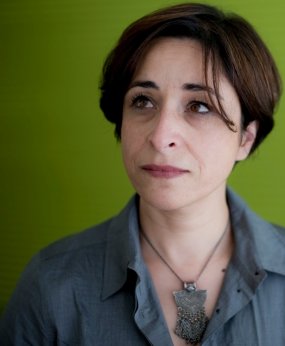
Literal Translations and First Meetings
I had the opportunity to meet Shakila Azizzada at her home on 6th November 2011 when I travelled to the Netherlands on other business. During this visit, it was a pleasure to get to know Shakila and her family and learn about her life and the story of her immigration to the Netherlands. This provided valuable context for understanding her creative work and inspirations, and paved the way for a warm and positive working relationship.
She gave me copies of nine previously published poems and two new ones and I annotated them as we discussed them in depth. She described the circumstances that had inspired individual poems’ composition and the people to whom they were dedicated. She also explained metaphors and phrases that were either highly personal, or rooted in the colloquial language of Kabul, whose meanings were not readily apparent to me. In a few cases, since the Persian second and third-person singular pronouns are not gender-specific, she clarified these as well. There is also a tendency for the poet to address herself in a poem in the second person, so she clarified where in certain places ‘you’ in fact meant ‘I’
Following this very fruitful meeting, I made literal translations of these poems and three further ones, clarifying a few further points with Shakila over Skype. I then met Mimi in London on 7th December and we went over all the poems in detail, passing on Shakila’s explanations: another warm and productive meeting. I also read the poems out for Mimi in Persian, which she understands at a conversational level, to allow her to hear the rhythm and any instances of word play or double meanings, and later created recordings for her that she could listen to when necessary.
Although I had wanted to complete all the literal translations by the beginning of December, as we agreed earlier with Mimi, I did not receive the rest of the poems (a total of 24) from Shakila until mid-January 2012, due to a hectic December travelling schedule for both of us and software problems she was having.
Polishing the First Draft
I completed the rest of the literals and met Mimi again for a marathon five-hour discussion on 24th January 2012. This meeting was both extremely inspiring and slightly challenging. Inspiring, because it was a delight to see how Mimi had turned around the sometimes awkward literal translations into light and lively poetry that worked in English; and challenging when I felt that some of those translations departed too much from Shakila’s original meanings. It was frustrating for me to think that perhaps I had not adequately conveyed some of the subtleties in the literals, or perhaps Shakila’s intentions were still ambiguous even to me.
An interesting case in point is the poem ‘The Tryst’. It slips between a memory, a dream, and an imaginary conversation with an unseen interlocutor, and this subtle progression must be conveyed. Mimi and I discussed this at length, as she rightly insisted that the elliptical way in which Shakila achieved this progression in the Persian would not be clear enough in English, and my literal translation did not work either. We eventually settled on her solution, which you can see in the final translation. Another poem described the oneness experienced with a lover during orgasm as ‘passing through/entering [his] skin’, in my literal translation. Mimi was unhappy with this metaphor in English and suggested an alternative which Shakila found too forthright, and the poem was eventually dropped. Several other poems had suffered the same fate when Mimi could not relate to the images in them. She had either struggled with their translations, or set them aside. In some cases, it was because a poem that was quite groundbreaking in Persian because it introduced direct, ‘Western’-style expression, imagery and emotions not often used by Persian-language poets – women in particular – seemed too ordinary when rendered in English precisely for the same reason.
Following this meeting, there was a bit more to-and-fro with Shakila on Skype and Mimi via email to find the best possible solutions to these dilemmas. In the final instance I deferred to Mimi’s creative license as I agreed it was important to have the poems ‘work’ as stand-alone English-language poems as long as the meaning was not altered. I had great admiration for Mimi’s artistic integrity, attention to detail and insistence on idiomatic and emotional naturalness in English, and I learned a great deal about writing and translating poetry from her.
Final Selection of Poems
Shakila’s 24 poems fell, roughly speaking, into a few (sometimes overlapping) categories: poems grieving for, and yet determinedly moving on from, a lost love; poems of an exile’s isolation and nostalgia; love and mildly erotic poems; and poems documenting the horrors and human costs of war in Afghanistan. A few others were critical of Afghanistan’s conservative society, and a few were personal vignettes dedicated to friends and loved ones. Mimi and I tried to ensure that each of these categories was represented, but especially when two poems had to be dropped from the chapbook due to space limitations, ultimately the primary consideration was how successful Mimi felt the poems were in translation.
Problems and Challenges
Aside from encountering the difficulties of translation that are inherent to the job, it was difficult to accommodate the schedules of three busy women with full-time jobs, particularly when Mimi experienced a bereavement, Shakila was injured in a fall, and Shakila and I both struggled with uncooperative Mac computers that refuse to support right-to-left scripts. This sometimes led to delays and stress, but I was very grateful for everyone’s dedication and Sarah Maguire’s patience, good humour and flexibility, which helped us navigate the tensions.




